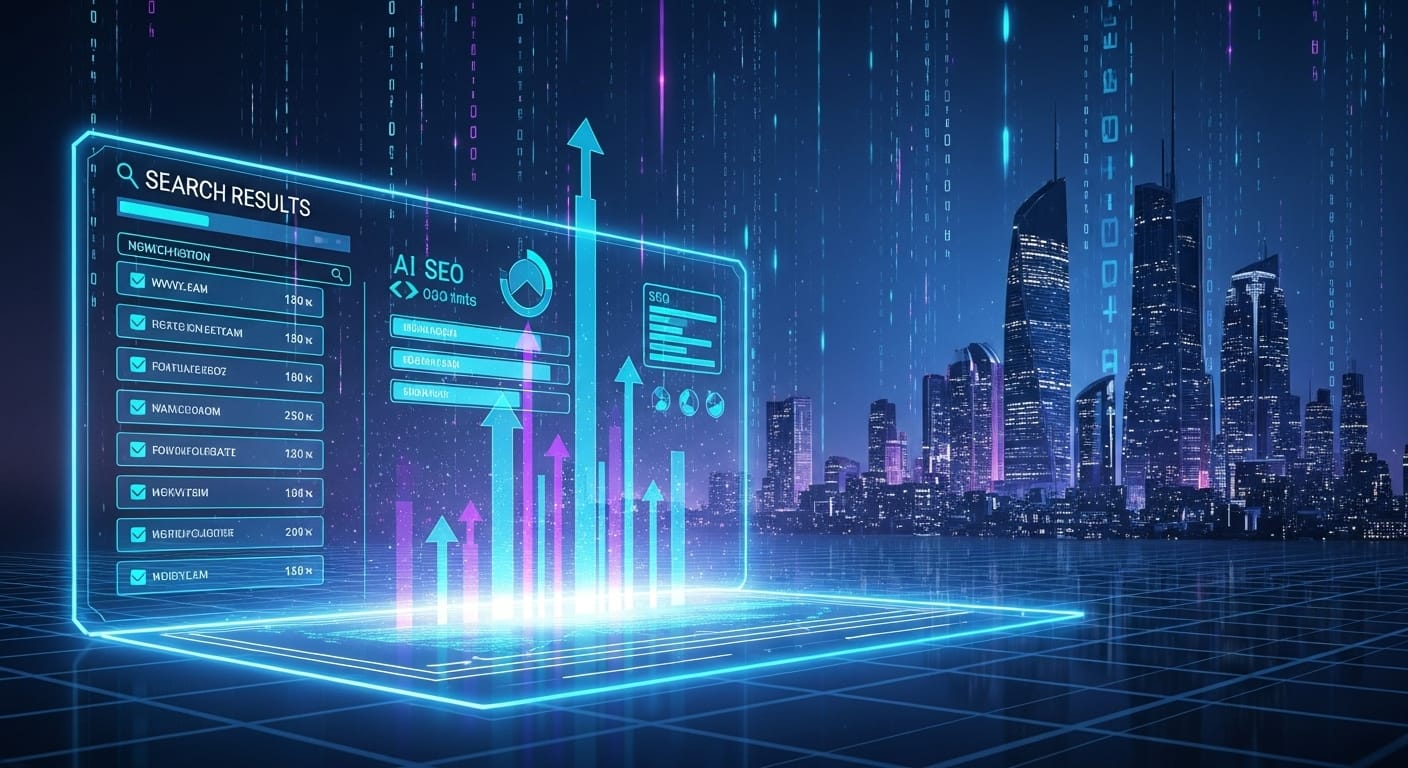- Amu M
- 0 Comments
- 26 Views
Artificial Intelligence (AI) is reshaping nearly every industry, but perhaps its most profound impact is on search ranking and SEO. From Google’s evolving algorithms to AI-powered content creation and optimization tools, “AI ranking” is quickly becoming one of the most important concepts for businesses, marketers, and publishers.
In this comprehensive guide, we’ll explore what AI ranking means, how it works, why it matters for SEO, and practical strategies to leverage AI to boost visibility in 2025 and beyond.
What Is AI Ranking?
AI ranking refers to the way artificial intelligence systems evaluate, prioritize, and order content in search engine results or recommendation systems. Traditionally, ranking factors were built on manual algorithms—keyword frequency, backlinks, and meta tags. Today, AI models like Google RankBrain, BERT, and Gemini, as well as generative AI like ChatGPT and Gemini Advanced, play a critical role in deciding:
Which pages appear at the top of search results.
How AI assistants answer user queries.
What content is promoted in AI-driven features like Google AI Overviews or Microsoft Copilot.
In short, AI ranking is the new SEO battleground—and understanding it is vital for staying competitive online.
Why AI Ranking Matters in 2025
The rise of AI-powered search has dramatically changed user behavior. Instead of sifting through multiple links, people now rely on direct AI answers.
Here’s why AI ranking is a game-changer:
Visibility in AI Overviews
Google’s AI Overviews (formerly Search Generative Experience) provide summarized answers at the top of results. If your content isn’t ranked by AI, you risk invisibility.Voice and Conversational Search
With the growth of voice assistants and conversational AI, ranking factors now include context, intent, and natural language processing (NLP), not just keywords.Content Saturation
AI tools have lowered the barrier for publishing content. With millions of new pages generated daily, only those aligned with AI ranking systems will surface.E-E-A-T Alignment
Google emphasizes Experience, Expertise, Authoritativeness, and Trustworthiness (E-E-A-T). AI ranking models prioritize credible and reliable sources.User-Centric Metrics
Engagement signals—like dwell time, click-through rates, and content satisfaction—are now evaluated by AI, making user experience (UX) inseparable from SEO.
How AI Ranking Works
While search engines keep their exact algorithms secret, SEO experts and AI research reveal several core mechanisms:
1. Natural Language Processing (NLP)
AI models like BERT and MUM analyze context and meaning in queries rather than just exact keywords.
2. Machine Learning Feedback Loops
Search engines track user behavior (clicks, time on page, bounce rates) to continuously refine ranking results.
3. Semantic Understanding
AI connects related terms and entities, so ranking is based on topic clusters and not isolated keywords.
4. Multimodal Inputs
Modern AI ranking includes text, images, video, and structured data—optimizing multiple formats is essential.
5. Content Quality Scoring
AI measures factors like factual accuracy, depth, originality, and readability to promote high-quality pages.
Traditional SEO vs. AI Ranking: What Changed?
| Factor | Traditional SEO | AI Ranking in 2025 |
|---|---|---|
| Keywords | Exact match keywords important | Context and intent more critical |
| Backlinks | High authority backlinks dominated | Still relevant but weighed with trust signals |
| Content Length | Longer often ranked better | Depth + relevance outweigh word count |
| Technical SEO | Speed, indexing, mobile-friendly | Still essential, but UX signals added |
| Authority | Domain/Page Authority (DA/PA) | E-E-A-T & entity recognition prioritized |
| User Behavior | Secondary ranking factor | Core AI-driven signal |
| Formats | Text-focused | Text, video, audio, structured data |
How to Optimize for AI Ranking
To succeed in AI-driven search, businesses must adapt their SEO strategies. Below are actionable steps:
1. Prioritize E-E-A-T
Display author credentials.
Cite reliable sources.
Build trust with HTTPS, clear policies, and reviews.
2. Optimize for AI Overviews
Use clear, concise answers within content.
Add FAQ sections to anticipate AI snippet extraction.
Incorporate structured data (schema markup).
3. Target Semantic Keywords
Create topic clusters around core themes.
Use LSI (Latent Semantic Indexing) keywords naturally.
Focus on search intent—informational, navigational, transactional.
4. Improve User Experience
Fast-loading pages.
Mobile-first design.
Scannable formatting with headings, lists, and visuals.
5. Diversify Content Types
Video summaries for YouTube and Shorts.
Infographics for social sharing.
Podcasts and transcriptions for conversational search.
6. Embrace AI SEO Tools
Surfer SEO for content optimization.
MarketMuse for topical depth.
Ahrefs + Semrush for backlinks and keyword intelligence.
The Role of Generative AI in Ranking
Generative AI tools like ChatGPT, Claude, and Gemini don’t just produce content—they also influence search engines.
AI-written content must be reviewed for originality and accuracy to avoid penalties.
AI detection systems are improving, but search engines care more about value to readers than authorship.
Combining human expertise with AI drafting ensures high-ranking content that meets E-E-A-T standards.
Future Trends in AI Ranking
Search Moves Beyond Pages
Instead of browsing websites, users will increasingly interact with AI assistants that deliver curated answers.Entity-Based SEO
Ranking will focus on people, places, and brands as entities, not just pages.AI Personalization
Different users will see different results depending on history, preferences, and context.Multimodal Search
AI ranking will prioritize content that integrates text, image, audio, and video seamlessly.AI Compliance and Ethics
Ethical signals—transparency, source citations, and bias reduction—will influence rankings.
Case Study: AI Ranking in Action
A mid-sized South African hosting company optimized for “web hosting South Africa” by:
Creating AI-friendly FAQs around pricing and features.
Adding schema markup for products and reviews.
Publishing E-E-A-T-driven articles authored by industry experts.
Within six months, the company achieved top placement in Google AI Overviews, driving 40% more organic traffic and reducing dependency on paid ads.
Challenges and Risks of AI Ranking
Content Overproduction
Too much AI-generated content risks saturation and duplication.Bias in AI Models
Ranking may unintentionally favor larger brands or English-first content.Decreased Organic CTR
AI Overviews reduce clicks to websites, requiring new traffic strategies.Constant Adaptation
AI algorithms evolve rapidly—SEO must remain flexible.
Action Plan: Winning with AI Ranking in 2025
Audit content for E-E-A-T alignment.
Implement structured data for all services/products.
Create content hubs targeting user intent.
Track AI Overview presence alongside traditional SERPs.
Leverage AI SEO tools for optimization and analysis.
Build authority with real-world signals: PR, citations, and expert authors.
Conclusion
AI ranking is no longer the future—it’s the present reality of SEO. Businesses that adapt to AI-driven algorithms, user-centric signals, and multimodal content will thrive. Those that cling to outdated keyword stuffing or low-quality backlinks will fade into digital obscurity.
The winners in 2025 and beyond will be those who blend human expertise with AI efficiency—creating content that is credible, relevant, and optimized for both humans and machines.




